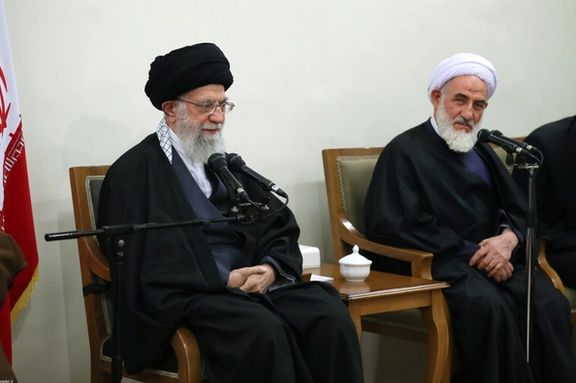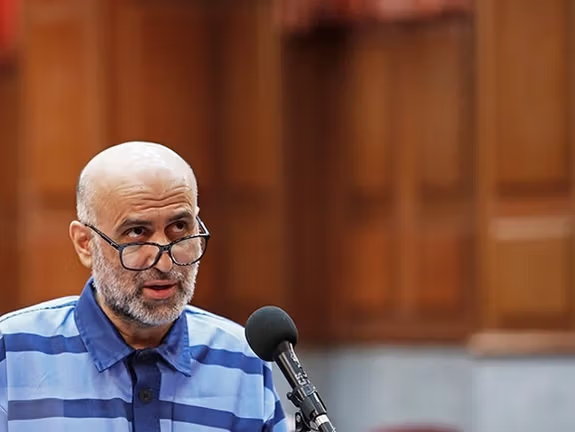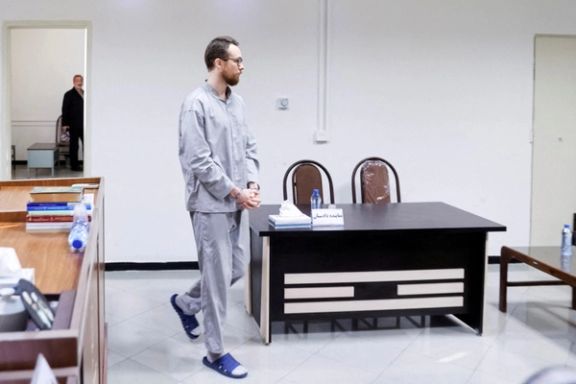Khamenei's Aide Killer Executed In Iranian Prison

A man convicted for the murder of an aide to Supreme Leader Ali Khamenei has been executed in Iran.

A man convicted for the murder of an aide to Supreme Leader Ali Khamenei has been executed in Iran.
Abbasali Soleimani, a former representative of the Guardian Council, was shot dead at a bank in Babolsar in April.
The execution took place on Wednesday morning in Babol prison, in the presence of members of Soleimani's family, according to a report by Mizan news agency, which is affiliated with Iran’s judiciary.
Judges of the Islamic Republic had endorsed the "Qisas" (retaliation in kind) sentence for the perpetrator. The Supreme Court upheld the decision.
Various narratives surrounding the assailant's motive have circulated within Iran. Hamshahri newspaper, affiliated with the Tehran Municipality, suggested a day after the incident that the murder stemmed from a disagreement between the bank guard and the bank's deputy "over work-related issues". The killer is said to have mistaken Solimani for the brother of the bank's deputy.
An alternative account surfaced on social media, suggesting that Solimani went to the Babolsar branch of Bank Melli to withdraw 34 billion rials (approximately 70,000 USD) in cash. Reportedly, after being told by the bank's director that the requested amount was not present in the branch, a financially struggling retired police sergeant shot him dead.
A video from inside the bank displayed the guard calmly approaching Solimani, seated on a chair, and shooting him. Bystanders promptly detained the assailant, who offered no resistance.
The killing of Abbasali Soleimani was part of a series of attacks on clerics which have taken place across various Iranian cities since Women, Life, and Freedom protests began last year.

Iran has quadrupled its oil revenue since President Joe Biden took office, helping the regime better fund its malign activities, a Congressional hearing was told on Tuesday.
China buys almost three-quarters of the Iranian crude oil shipments, according to experts’ testimony at the hearing, making the most of the Biden administration’s reluctance to antagonize Tehran.
“The Biden administration has taken a consistently weak approach to enforcing the energy sanctions that would have the strongest economical impact on Russia, Iran and Venezuela,” said Rep. Blaine Lutkemeyer, chairing the hearing.
“Iran has been emboldened to throw its weight around the Middle East from Yemen to Gaza, with it or its proxies directly attacking US military sites and warships essentially without consequences,” he added.
The hearing was entitled Restricting Rogue-State Revenue: Strengthening Energy Sanctions on Russia, Iran, and Venezuela. It was hosted by the US House Financial Services Subcommittee on National Security, Illicit Finance, and International Financial Institutions.
Recent data show that “due to diminished sanctions enforcement, Iran has accumulated north of $80 billion dollars in oil revenues since 2021,” said Claire Jungman, chief of staff of United Against Nuclear Iran (UANI).
Investigations by United Against a Nuclear Iran (UANI), an advocacy group in Washington, suggest that Iran has between 300 and 400 “foreign owned and foreign flagged oil tankers shifting its oil.” These are called the “ghost fleet,” vessels that operate under the radar and are not sanctioned by the US.
Almost half these vessels are flagged by Panama – in the US backyard.
Last week, 15 Members of Congress called on the US Secretary of State Antony Blinken to crack down on a “ghost armada” of ships that evade sanctions and find ways to hold Panama accountable for their complicity in Iranian funded terrorism.
Biden critics say his Iran policy has had disastrous consequences for the region and beyond. They argue that Hamas –funded primarily by Iran– could not have pulled off the horrors of 7 October without support from a regime flush with new cash.
Since October 17, militant groups backed or affiliated with the Islamic Republic have attacked American troops 92 times with little or no retaliatory operations by the US.
“The Iranian regime is largely unconstrained and unfettered from a resource standpoint, said Marshall Billingslea, former assistant secretary of the Treasury for terrorist financing. “They’ve gone right back to where they were after the JCPOA was enacted by the Obama administration.”
The JCPOA (or the Iran nuclear deal) was signed in 2015. President Trump ripped it off shortly after taking office and introduced the Maximum Pressure campaign to squeeze the Islamic Republic. After Trump, that campaign was abandoned for a more lenient policy that was hoped to set the scene for a return to some form of a nuclear agreement.
Rep. Dan Meuser said this thinking was flawed. “Our foreign policy prioritizes appeasement over strength. Appeasing hostile regimes does not bring peace, but undermines it.”
Last September, the Biden administration released $6 billion in frozen Iranian oil money to help facilitate the return of five Iranian-Americans held hostage in Tehran. The decision was opposed vehemently by Republicans who said the money would be used for malign activities, regardless of any restricting stipulations in the deal.
Democratic Congresswoman Joyce Beaty countered this in the hearing.
“Under the Biden administration, the US maintained the most extensive set of comprehensive sanctions against Iran, including those related to the illicit sales of Iranian oil,” Rep. Beaty said. “Contrary to accusations leveled by the Republicans, Secretary [of the Treasury] Yellin recently set the record straight that we have not in any way relaxed our sanctions on Iranian oil.”
However, the issue, as set forth by experts at the hearing, is primarily “enforcement” of the sanctions when it comes to Iran.
“The real problem for Iran is not that they’re getting $6 billion into the system,” said Adam Smith of Partner, Gibson, Dunn & Crutcher, “it’s their ability to use that $6 billion to buy things, to send to Hamas, to send to Houthis, etc.”
Chairman Lutkemeyer agreed. “The United States and its allies should return to an approach of strongly reinforcing energy sanctions against these rogue regimes to weaken our enemies,” he said.
Another lawmaker, Rep. Zach Nunn, who has introduced a bill to enhance sanctions enforcement, highlighted the need for new technologies to improve surveillance and tracking (of ghost fleets, for instance) as a necessary step to keep up with increasingly sophisticated methods used by Iran to circumvent sanctions and sell oil.
Such practical considerations, however, are secondary. The real issue is not so much the capabilities than is willingness to change course. And that’s what many critics of the Biden administration say is missing.
“Autocratic regimes have for years tried to advance the narrative that sanctions don’t work,” said Billingslea, “And now some in Washington DC are beginning to parrot their talking points… Sanctions do work when applied properly and enforced.”

A former Iranian official, implicated in smuggling 2.4 tons of gold, returned from Canada where many individuals linked to the Islamic government have found refuge.
Mostafa Niazazari, recently back in Iran, was a key figure in the Tabari network, named after Akbar Tabari, the Judiciary’s former Executive Vice President and Finance Director for over two decades. His network orchestrated a massive corruption and bribery scheme involving numerous officials, most of whom evaded accountability, as is often the case with individuals tied to the Islamic Republic. Transparency International ranked Iran 150th out of 180 countries in its 2021 Corruption Perception Index as one of the world's most corrupt countries.
Niazazari's return garnered significant coverage in Iran's state media, with one newspaper labeling him an "asset" of the Islamic Republic. The reformist daily Shargh quoted him as saying, "Ambiguities related to Mr. Tabari's case have been resolved, and obstacles to return have been eliminated."
Living in a $7-million mansion in Canada's West Vancouver since fleeing Iran during Tabari's investigation, Niazazari represents a pattern of Iranian officials seeking refuge in Canada for good or until they can safely return. His office in the same city is valued at $5 million.

Despite Canada’s measures to deny entry to officials of the Islamic Republic, the country remains one of the safe havens of regime officials who are at their low in their relations with the government in Trehan. Most of Ottawa’s restrictions do not lead to tangible results because the ban on regime officials “applies to those who were senior officials at any time from November 15, 2019, onwards,” limiting the punitive impact of the measure.
In 2019 and 2020, a wide-ranging investigation and trial implicated dozens of individuals in corruption schemes that took place during the tenure of former Judiciary chief, Sadegh Amoli Larijani, who was removed from his post in early 2019. The Larijani family enjoyed unparalleled power and influence for more than a decade. Another brother, Ali Larijani was Speaker of Iran’s parliament until May 2020. The case was perceived as a deliberate effort to undermine the Larijani family.
Ebrahim Raisi, then the new chief justice, ordered the arrest of Tabari in July 2019. In addition to his 31-year sentence for corruption and bribery, Tabari received 12 years of prison time for money laundering and 15 years for other crimes, giving a total of 58 years -- although according to law he will serve only 31 years. In June 2023, the judiciary announced that Tabari was released from prison after serving just 45 months after posting a bail equivalent to $6 million. In August, his sentence was revised to 12.5 years, and he returned to prison.

During the course of the case, Niazazari was convicted for smuggling two metric tons of gold into Iran as well as bribery. According to the prosecutor's office, Niazazari had reportedly given five lots of land totaling 15,000 square meters as well as three villas in the northern city of Babolsar to Tabari as a bribe. His father, Kiumars Niazazari, who was the head of the intelligence department in Mazandaran province from 2006 to 2016, was also arrested at the time.
Niazazari was first arrested in December 2011 at the age of 32 on charges of smuggling, money laundering, obtaining credit with fake documents, and bribery. He had established a cover company named Vizor, managed by his wife, in Dubai and had secured discounted foreign currency from the Central Bank of Iran on 31 occasions and transferred the funds to the company's account in the UAE, instead of spending the money on imports as he was supposed to.
When Tabari, using his money and connections, pulled some strings to sweep his case under the rug, Niazazari was acquitted of all charges and released.
The reduction of Tabari’s sentence to a fraction of his original prison term and a hero’s welcome for Niazazari suggest a recurring pattern of recycling financial corruption ringleaders by the Islamic Republic. Large-scale corruption cases in Iran tend to surface around election time, raising suspicions that authorities play these cases like chess moves to remove or empower certain candidates. Analyst Amirhadi Anvari referred to the recently revealed $3.5 billion embezzlement case of Debsh Tea Company as a means to purge political rivals through exposing their wrongdoing.

The majority of Iran’s people are unhappy with the regime’s “costly” hostility to the West, according to a former president of the Islamic Republic.
Mohammad Khatami – a reformist figure who held office from 1997 to 2005 – voiced his criticism of the current government’s foreign policy in a speech he shared with his advisers.
Highlighting the gap between Iran’s official approach and public sentiment, he said while officials see themselves as "anti-imperialist and anti-colonial" in their dealings with the West and particularly the United States, most Iranians seek a different direction.
Khatai said: “Today, we are in a situation where, if we don't say the majority of people are in favor of de-escalation in relations with America, at least we can say they are dissatisfied with the current foreign policies and the anti-Western stance of the government.”
In recent years, the Islamic Republic has established proxy groups in various Middle Eastern countries, including Yemen, Lebanon, Iraq, Syria, and the Gaza Strip, providing them with financial and military resources. The groups, referred to by Iranian authorities as "resistance groups," specifically target US bases in the region.
After the October 7 attack by the terrorist group Hamas on Israeli soil, leading to a conflict in the Gaza Strip, Iran's proxy groups intensified their attacks on US and Israeli positions in the region.
Khatami also criticized the state of the country's universities, stating that due to the prevalence of a "security-military outlook," the independence of these institutions and the role of academics in Iran's development have been compromised.
Following the active participation of students and university professors in the 2022 protests, the administration of President Ebrahim Raisi, along with other security and judicial institutions, has issued expulsion, suspension, or non-renewal of contracts for dozens of university professors in recent months.

Iran's foreign ministry says there is “sufficient evidence” for the charge of espionage brought against a Swedish EU diplomat whose trial began in Tehran Saturday.
Iran's judiciary on Sunday accused Johan Niels Floderus, a 33-year-old Swedish citizen and EU diplomat of extensive intelligence collaboration with Israel against the Islamic Republic.
The foreign ministry spokesman Naser Kanaani on Monday backed the hardliner Judiciary that has accused other foreigners in the past for similar crimes. Kanaani insisted that charges and crimes committed by Floderus have been clearly defined by the judiciary and sufficient evidence has been provided.
However, similar trials against foreigners in the past were held behind closed doors, without due process of law.
Judicial process will be followed in Floderus’ case, Kanaani said, implying that there could be no intervention by the foreign ministry or other authorities to secure his release from prison. “The judiciary will perform its duties as an independent authority,” he said.

Kanaani added that the Swedish government has been informed of the details of the case, but there is no evidence of that.
“The defendant has been active against the Islamic Republic of Iran in the field of information collection for the benefit of the Zionist regime in the form of subversive projects conducted by well-known American, Israeli and European institutions active in this area,” a statement by the prosecutor read at the first session of Floderus’ trial Sunday alleged.
The prosecutor has demanded sentencing Floderus in accordance with article 286 of Iran's Islamic Penal Code. This article stipulates that anyone found guilty of extensive crimes against the Islamic Republic’s domestic or international security leading to “serious disruption in public order and security in the country” should be sentenced to death for “corruption on earth”.
"Johan Floderus has been arbitrarily detained and every accusation and charge is false," a spokesperson for Sweden's foreign ministry said in an emailed comment to Reuters on Sunday.
Top EU foreign policy chief Josep Borrell also urged Iran on Sunday to free Floderus immediately. "I persistently raise the case at every occasion and contact with the Iranian authorities, since his detention, requesting his liberation," he said.
"We are seeking clarification and more information from them, in closest coordination with the Swedish authorities who bear the consular responsibility," he added.
Many believe that the Swedish EU diplomat whose family and friends say was on holiday in Iran is a victim of the Islamic Republic’s ‘hostage policy’.
The Islamic Republic has widely been accused of routinely arresting foreigners and dual citizens to use them as bargaining chips against Western countries and can demand the release of its own nationals held in Sweden such as Hamid Nouri, a former deputy prosecutor, in return for freeing Floderus, a citizen of Sweden and the European Union in danger of execution.
Nouri is serving a life sentence in Sweden for human rights violations as a prison official in 1980s when thousands of detainees were hanged in Iranian prisons after summary trials that sometimes lasted only minutes.
Iran's judiciary recently called on Swedish authorities to ensure “fair and appropriate procedures” regarding Nouri’s appeal which started in January. The verdict of the appeals court is scheduled to be announced on December 19.
The unfreezing of $6b by the United States a few months ago was widely interpreted as the cost of freeing five American-Iranian hostages that Iran had held for several years.
Floderus, who previously worked on the Afghanistan desk of the EU’s external services department, was detained on April 17, 2022, at Tehran’s Imam Khomeini Airport while waiting to depart Iran.
He was covertly detained for over 500 days before a report by The New York Times in September brought his circumstances to public attention. .

A dental surgeon in Iran who refused to wear hijab at an honorary ceremony has been expelled from her medical university.
Fatemeh Rajaei-Rad revealed she had received an expulsion order from Amol University of Medical Sciences in a post on her Instagram account on Tuesday.
She had come to public attention earlier this year when she declined to wear hijab in attending a ceremony at which she was awarded the title of Exemplary Surgeon.
The video of her attendance without a hijab circulated widely on social media, eliciting praise for her courage from many Iranians.
However, it also drew condemnation from government officials, including Supreme Leader Ali Khamenei's representative in Mazandaran province and the Friday Prayer Imam of Amol, who called for "severe action" against her.
Following the ceremony, Fars News Agency reported that Rajaei-Rad was summoned to the prosecutor's office in Amol and was denied access to Babol University of Medical Sciences, where she was teaching.
Additionally, three managers from the health department of Babol city were dismissed due to their perceived lack of reaction to Rajaei-Rad's presence without hijab during the ceremony.
Under mounting pressure, some government-affiliated media released a video in which Rajaei-Rad purportedly "apologized" for causing discomfort and insult to those "who observe complete hijab." It follows the well-documented history of the security and intelligence apparatus of the Islamic Republic using "coerced confessions" from critics, opponents, and protesters.